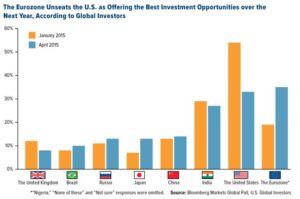Economic and Investment News Bits
- Columbus-based Cardinal Health (CAH) is still tops among Ohio companies on the Fortune 500 list. Cincinnati-based Kroger (KR) and Findlay-based Marathon Petroleum (MRO) are close behind. Cardinal ranks #22 on the list, while Kroger is #24 and Marathon #25 in the national ranking.
- “More policy news from China suggests that even when there is a near-term correction in Chinese stock markets, the bull will be able to continue. The central government may soon institute a form of QE, with the People’s Bank of China buying local government debt from commercial banks. At a stroke, such a program would deal with the bad debt created by the past years of property bubble excess, as well as curtail a critical avenue for corruption and theft. The government may also dramatically restructure its state-owned enterprises, streamlining the 115 currently in existence into 40, and managing them for efficiency. We view these moves as bullish for Chinese stocks,” (Source: Guild Investment Management).
- A National Institute on Retirement Security study found that 45% of working-age households have no retirement savings at all. Among the 55-64 age group, the average was only $14,500 in savings. How is this possible? The real median household income has plunged since 2000 as globalization, technology, too much debt, too little savings and investment have led to low income growth in the U.S.
- Michael McCaul, former U.S. ambassador to Russia, suggests that “there is no master plan by Russian president Vladimir Putin and that more annexation of Ukraine is not inevitable. That is the good news. The bad news is that Mr. Putin will remain in power through 2024 according to the terms of his re-election in 2012.”
- “While we do not know when or how the Fed is going to normalize interest rate policy, we do expect that it may involve significant dislocations, at least initially. Investors don’t seem to be getting compensated for moving out on the [fixed-income] risk curve,” (Source: Osterweis Capital Management).
Thought for the week
“I was raised as a hard-core liberal in New York city. My parents thought New Jersey was a southern state.”
Ari Fleischer, former White House press secretary (b. 1960)
Retirement Commentary for the Week
Two-thirds of all people in the world who were ever 65 years old are alive today. Can we really comprehend that statistic? It tells us a lot about the issues facing our country in the next 20-30 years, especially for programs like Medicare and Social Security. In 1900, life expectancy was 47 years. Today it is 79 years. Although women tend to outlive men by about 4.9 years, the trend is reversing as more women work, and they work longer and more stressful hours. Maddy Dychtwald, co-founder of Age Waves, asks “How old is old?” German president Bismarck established the first government pension in 1881, with 65 as the age to start receiving benefits. Unfortunately the life expectancy was 42, so there was not much chance the German government would have to pay out on its promised benefits. In the 1950s, 37% of U.S. population was under 15. Now the oldest segments of our population are the fastest growing.
Among key changes in retirement, Dychtwald’s study found that 29% of retirees never want to work for pay again; 8% want to continue working somewhere fulltime; 39% want to work part time; and 24% want to be able to cycle between work and leisure.
Graph of the Week (CLICK TO ENLARGE)
Among 1,280 Bloomberg subscribers, 35% recently singled out the Eurozone as the one market that will offer the best investment opportunity over the next year, an increase of 16% since January.
This material is distributed by PDS Planning, Inc. and is for information purposes only. Although information has been obtained from and is based upon sources PDS Planning believes to be reliable, we do not guarantee its accuracy. It is provided with the understanding that no fiduciary relationship exists because of this report. Opinions expressed in this report are not necessarily the opinions of PDS Planning and are subject to change without notice. PDS Planning assumes no liability for the interpretation or use of this report. Investment conclusions and strategies suggested in this report may not be suitable for all investors and consultation with a qualified investment advisor is recommended prior to executing any investment strategy. All rights reserved.
